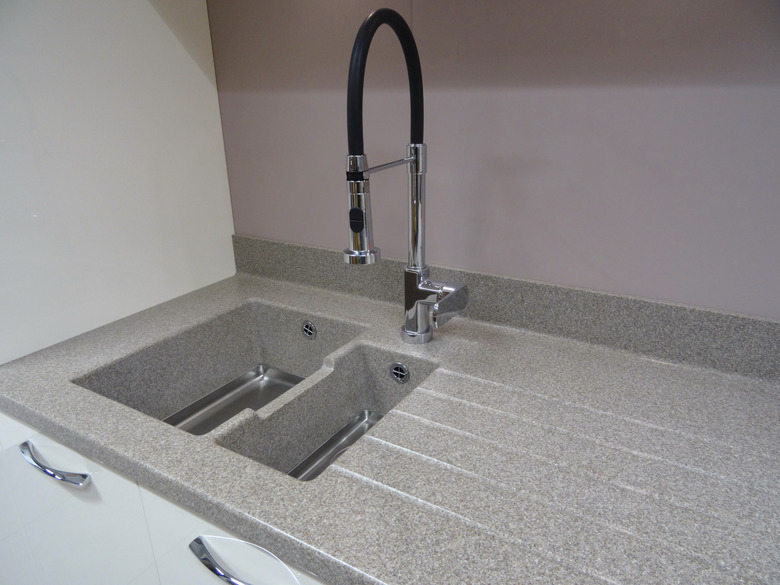How To Restore The Coating For A Composite Sink
Composite sinks are made of a composition of several types of highly durable materials, such as quartz, granite resin and heavy plastic dusts. Since these sturdy sinks are also easy to care for, composite sinks are popular in kitchens and workspaces. They can stand up to quite a lot of heavy use without dulling or cracking easily. However, a composite sink isn't completely impervious to scratches, dings and dulling over time. Removing scratches from composite sinks and returning the luster to a hazy finish requires a bit of elbow grease and gentle detergents.
Tip
Wiping the composite sink down after each use will keep hard water deposits from building up and creating a haze.
When to Restore Composite Sink
When to Restore Composite Sink
The durable surface of a gleaming composite sink can begin to look hazy after years of hard use. When the shine has begun to lift from the granite, quartz or other composite sink, it may need to be put through the restoration process.
Before restoring, give the sink a thorough cleaning. The haze could be from a buildup of detergents or hard water. Use a gentle cleaner, such as a mix of mild dish soap and warm water, to clean the composite material. Make a paste of equal parts of baking soda and water and apply that to the surface of the sink and leave overnight. Rinse clean and buff dry. If the haze remains, the composite sink may need to be re-sealed.
Preparing to Restore Composite Sinks
Preparing to Restore Composite Sinks
When working with detergents and taking down grime, use gloves and safety goggles. Tape off any areas that you don't want the sealant or detergents to be affected by.
The sink should be completely dry and free from any debris, hard water deposit buildups and other layers of dirt or grime so that the composite sink sealer will adhere well to the surface. Better Homes & Gardens recommends that the composite sink be thoroughly cleaned and sealed before finishing the restoration project with a polisher.
Granite Composite Sink Problems
Granite Composite Sink Problems
Although lovely to look at and a popular feature for potential homebuyers, granite composite sinks do have their issues. The granite composite sink problems include:
- Color uniformity — composite granite sinks are more uniform
in pattern and color than their natural stone counterparts. - Cost — The hardy composite granite sinks are much more
expensive than stainless steel or the classic porcelain style of sinks. - Hardness — The quality that makes them so desirable can also
make them a problem. Granite composite sinks are not as forgiving on glassware
and ceramics compared to stainless steel or other materials.
Composite Sink Restoration
Composite Sink Restoration
For composite sinks that have been etched by hard water deposits or have deep scratches, a finishing sander with 400-grit paper can remove the scratches. Deep scratches will need to be filled with epoxy or acrylic adhesive and sanded down. A granite composite sink repair kit can make the process of restoring the fixture easy.
Once the repairs are complete and the epoxy has had time to cure, wipe down and clean off any residue before applying the composite sink sealer. A sealant and polish with a neutral pH can be applied to the surface regularly to ensure that the haze doesn't return to the composite sink. Supreme Surface Cleaners recommends that the composite sink be wiped clean of water after each use to keep the surface haze-free.
